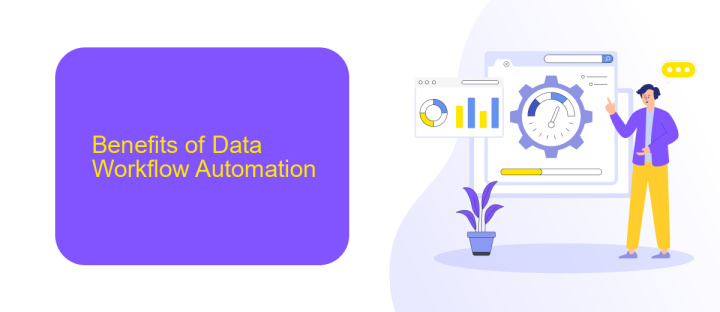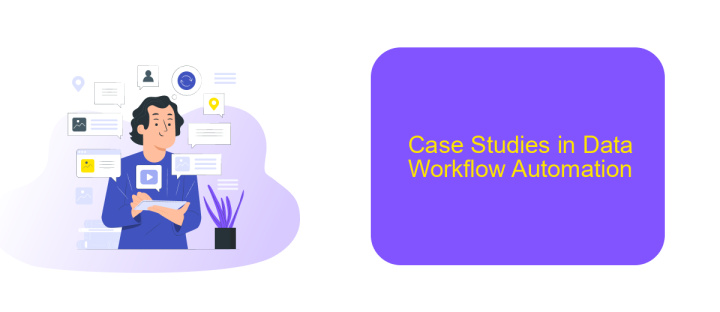What is Data Workflow Automation
Data Workflow Automation refers to the use of technology to streamline and automate the sequence of tasks and processes involved in managing data. This approach enhances efficiency, reduces human error, and ensures consistency across various data operations. By leveraging tools and software, organizations can optimize their data workflows, leading to improved productivity and more accurate decision-making.
Introduction to Data Workflow Automation
Data workflow automation is revolutionizing how organizations manage and process data. By automating repetitive tasks, businesses can significantly reduce manual errors, save time, and improve overall efficiency. This approach allows teams to focus on more strategic activities rather than getting bogged down by routine operations.
- Streamlined data processing
- Minimized human error
- Enhanced productivity
- Improved data accuracy
One essential tool for achieving seamless data workflow automation is ApiX-Drive. This service enables the easy integration of various applications and systems, allowing data to flow smoothly between them. By setting up automated workflows with ApiX-Drive, organizations can ensure that their data is always up-to-date and accessible, thus facilitating better decision-making and operational efficiency.
Benefits of Data Workflow Automation

Data workflow automation significantly enhances efficiency by reducing manual tasks and minimizing the risk of human error. Automated workflows ensure that data is processed consistently and accurately, leading to higher quality outputs. This not only saves time but also allows employees to focus on more strategic tasks, thereby increasing overall productivity. Additionally, automated workflows can be easily scaled to handle larger volumes of data, making them ideal for growing businesses.
Furthermore, data workflow automation improves data integration across various platforms and services. Tools like ApiX-Drive facilitate seamless integration by allowing different applications to communicate and share data effortlessly. This ensures that all systems are up-to-date and synchronized, providing a unified view of data across the organization. By streamlining data flow and integration, businesses can make more informed decisions, respond more quickly to market changes, and maintain a competitive edge.
Challenges of Data Workflow Automation

Data workflow automation offers significant benefits, but it also presents several challenges that organizations must address to ensure smooth operations. These challenges can range from technical issues to human factors, making it essential to understand and mitigate them effectively.
- Integration Complexity: Connecting disparate systems can be difficult. Tools like ApiX-Drive can simplify this process, but initial setup can still be time-consuming.
- Data Quality: Ensuring the accuracy and consistency of data across automated workflows is crucial. Poor data quality can lead to flawed insights and decisions.
- Scalability: As data volumes grow, maintaining performance and efficiency in automated workflows can become challenging.
- Security Concerns: Automating data workflows increases the risk of data breaches. Robust security measures must be implemented to protect sensitive information.
- Change Management: Employees may resist changes brought about by automation. Effective training and communication are necessary to facilitate smooth transitions.
Addressing these challenges requires a combination of the right tools, such as ApiX-Drive for integration, and strategic planning. By proactively identifying and mitigating these issues, organizations can fully leverage the benefits of data workflow automation.
Case Studies in Data Workflow Automation

One notable example of data workflow automation is a retail company that streamlined its inventory management process. By integrating various data sources such as sales data, supplier information, and warehouse stock levels, they managed to reduce manual data entry and improve accuracy. This automation allowed for real-time updates and better decision-making capabilities.
Another case involves a healthcare provider that automated patient data management. By using data workflow automation tools, they connected multiple systems including electronic health records (EHR), appointment scheduling, and billing systems. This integration not only reduced administrative workload but also enhanced patient care by providing timely and accurate information.
- Retail company: Automated inventory management, reduced manual data entry, improved accuracy.
- Healthcare provider: Connected EHR, scheduling, and billing systems, reduced administrative workload, enhanced patient care.
Moreover, businesses have leveraged services like ApiX-Drive to facilitate seamless integrations between disparate systems. ApiX-Drive enables organizations to automate data workflows without the need for extensive coding, allowing for quick and efficient setup. This has been particularly beneficial for small to medium-sized enterprises looking to optimize their operations with minimal resource investment.


Future of Data Workflow Automation
The future of data workflow automation is poised for significant advancements, driven by the increasing complexity of data ecosystems and the need for real-time processing. As artificial intelligence and machine learning technologies continue to evolve, they will play a crucial role in automating more sophisticated data workflows. These technologies will enable predictive analytics and automated decision-making processes, reducing human intervention and increasing efficiency.
Integration services like ApiX-Drive will become indispensable in this landscape, simplifying the process of connecting various data sources and applications. ApiX-Drive, for instance, allows businesses to effortlessly set up integrations without requiring extensive technical knowledge. This ease of use will empower organizations to quickly adapt to changing data needs and streamline their operations. As a result, the future of data workflow automation will be characterized by greater flexibility, improved accuracy, and enhanced scalability, making it an essential component of modern data management strategies.
FAQ
What is Data Workflow Automation?
Why is Data Workflow Automation important?
How can I implement Data Workflow Automation in my business?
What are the benefits of using ApiX-Drive for Data Workflow Automation?
Can Data Workflow Automation be customized to fit specific business needs?
Apix-Drive will help optimize business processes, save you from a lot of routine tasks and unnecessary costs for automation, attracting additional specialists. Try setting up a free test connection with ApiX-Drive and see for yourself. Now you have to think about where to invest the freed time and money!

